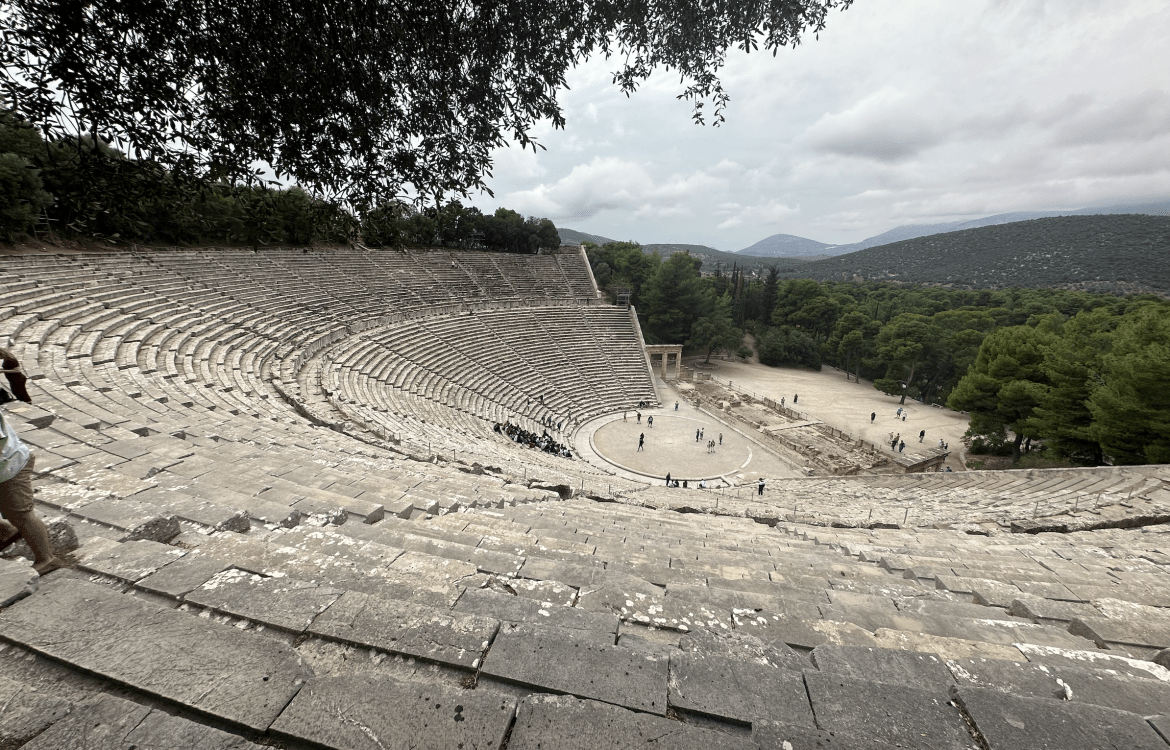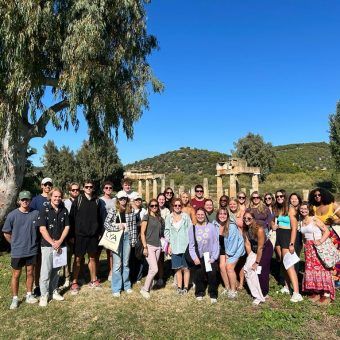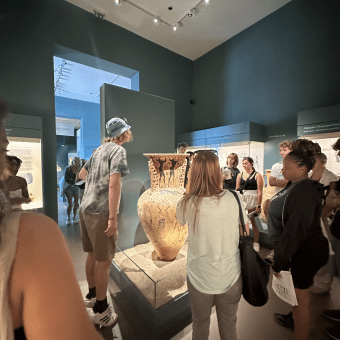
Piercing Through Millennia with Greek Mythology
[Article by CYA Fall ’23 Student Alexandra Berardelli]
Perhaps you were into Percy Jackson as a kid, or you played Assassin’s Creed: Odyssey in middle school, or you had a great Latin teacher like me. Wherever you come from, you’ve somehow found your way into Greek mythology. So, welcome to the club. As a Classics major studying in Athens for the semester, I can not help but wonder why we keep studying these stories about mythical figures and the divine. Sure, they are undeniably fascinating, but why is it worthwhile to keep reading them? What is in these stories that makes them so important to pass on to the next generation?
Tough questions. Still, they’re at the root of why I keep studying Classics, with a deep interest in mythology. As I attempt to better understand the timelessness and legacy of the work produced in the ancient world, it felt only natural to take a course on “Ancient Greek Mythology and Religion” with Professor Nina Papathanasopoulou here in Athens. The course began with the origins of both man and god, with the works of the Greek poet Hesiod. After establishing critical themes like honor, loyalty, generationality, and femininity, we looked at narratives surrounding Greek gods, the Agamemnon saga in the Oresteia, the Oedipus complex in Sophocles’ Oedipus Tyrannus, the mad female heroine Medea, the cunning Odysseus in the Odyssey, among many others.
This course is creatively geared toward the contemporary audience of students from many different academic backgrounds. Naturally, as a Classicist, I pay special attention to the cultural significance of these stories for the Greeks of the ancient world. But, in every class, through our lectures and discussions, there is always something new, given the variety of perspectives from my peers. I’ll give you a glimpse into what’s been valuable in this course. One of the last texts we read was the Odyssey, in which there is a richness of themes and values concerning nostos, piety, and honor. All of these themes and more are crucial to the story, but their importance varies given personal interpretation. I felt deeply connected to the idea of nostos, but we had a vibrant conversation about Penelope’s role in Ithaca, Odyssey’s strength and creativity in different episodes during his journey home, and other memorable scenes from our personal readings. During our in-class reflection on the course, many people who are not Classics majors brought up the way the course provoked them to think about how closely connected the ancient Greeks and the divine would be, this time putting ourselves into the mix.


There are millennia between us and these mythological stories. The difference between taking this course at my home institution and here in Greece is, well, we’re in Greece. So, we have this ancient world at our very fingertips. When we learned about Athena, for instance, we did it right at the spot of her worship: at the Parthenon, for Demeter, we were at Eleusis, for Artemis at Brauron. There is no better place to think about these goddesses’ influence than in the same environment the ancient Greeks would think about their divine strength and wisdom.
Being in Greece, we found these themes and stories around us constantly. Even when we weren’t in class, we were able to think about the course in places far from Athens, like healing surrounding the worship of Asclepius in Epidaurus in the Peloponnese or Theseus and the Minotaur at the Palace of Knossos on the island of Crete. All students were required to go on these trips. While we were not intentionally looking at the mythological significance in every different place, it would be challenging to be in such a course and not acknowledge the importance of these stories around Greece. Everyone can feel connected to these stories because the themes are fundamental to understanding the human condition. Since then, we have been defiant in our literature and culture regarding politics, gender ideology, and basic morality. These things will never change in the same way we can and should continue to explore their meanings in ancient texts.
In the ever-changing world, I sometimes question if it’s truly important, or even worth it, to keep studying these stories. In my deepest periods of doubt, there often is a moment that makes me remember the universality of these stories, – their attention to human relationships, to the role of fate and the divine, to conceptions of justice, or to what we consider heroic – and how we need them if we want to understand our world—in this very course, these moments occurred standing in the center of Artemis’ temple in Brauron, watching a performance of Sophocles’ Electra in the ancient theater of Herodes Atticus, studying the Parthenon marbles next to the Parthenon itself, and just reading and discussing these stories with many unique individuals.






